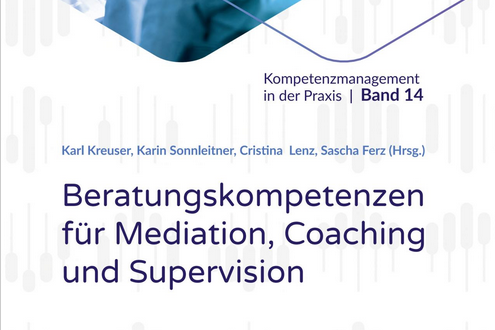Karl Kreuser, Karin Sonnleitner, Cristina Lenz, Sascha Ferz (Eds.)
Waxmann Verlag, 2022, 144 pages
The edited volume Consulting Competences for Mediation, Coaching, and Supervision addresses a topic that is becoming increasingly relevant for leaders as well: What skills are needed to design consulting and transformation processes effectively?
The editors and contributors – recognized experts from both academia and practice – explore the essence of consulting competence. Their starting point is the competence theory of Volker Heyse and John Erpenbeck. They define competences as the preconditions for action – the fundamental ability “to navigate new, open-ended, unpredictable, and dynamic situations and to take effective action.”
This makes one thing clear: competence is more than knowledge or technical skill. It is the ability to stay capable of acting under uncertainty and to shape the new.
A shared foundation – diverse perspectives
- Karl Kreuser defines consulting competence and emphasizes that consultants do not provide ready-made solutions but instead enable their clients to activate their own resources and competences.
- Sascha Ferz and Karin Sonnleitner present empirical findings from a survey of mediators. Comparing data from 2010 and 2021, they identify a clear ranking of the eight most important competences. The results highlight personal and social competences – especially communication skills – as critical for success, rather than technical or methodological expertise.
- Cristina Lenz outlines approaches for future-oriented training in mediation and demonstrates how experiential learning – for example, through role play – can sustainably develop consulting competences.
- John Erpenbeck reflects on the central role of values, calling them the core of every competence. Particularly in conflicts, the issue is rarely a lack of knowledge but rather differing value orientations – an insight highly relevant to leadership conflicts as well.
- Further contributions, such as Yvonne Hofstetter Rogger on training practices in Switzerland or Thomas Hobrecht on developing a mediative mindset, highlight the societal and institutional dimensions of client-centered consulting.
No competence without knowledge – but knowledge alone is not competence
The book’s central message reaches far beyond the consulting professions: Competence fully includes skills, knowledge, and qualifications. Yet one can possess tremendous knowledge and still be unable to act. Erpenbeck describes this as “highly qualified incompetence.”
For employee development, this means leaders should not focus solely on transferring knowledge. Instead, they should create opportunities for targeted competence training that helps employees transform knowledge into self-directed, creative action – applying it effectively in new and uncertain situations.
The volume opens an important perspective for leadership in times of growing complexity and uncertainty: leadership means creating spaces for dialogue and self-organization, empowering employees to take ownership, and fostering competences holistically – including value orientation.
Consulting competence thus becomes a key resource for guiding teams through change processes and co-creating sustainable solutions.
Anyone seeking to understand how competence functions as a guiding capacity – and why values, dialogue, and process design are decisive for sustainable leadership – will find this book both substantial and thought-provoking.
Consulting Competences for Mediation, Coaching, and Supervision invites leaders to rethink their role: not just as decision-makers, but as process designers and competence developers.


Recent Comments